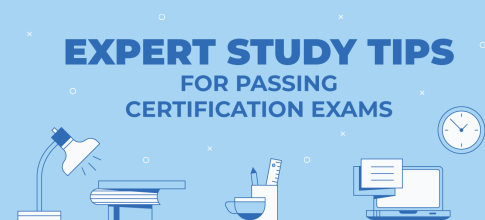
Deciding to get a new certification or license is exciting! Pursuing a license could mean you’re exploring a new profession or looking to advance in your current career. Many industries require some type of certification before you can start working. Mortgage broker, therapists, and auto dealers are a few jobs that require a certification.
Studying for a certification or licensing exam is very different from an academic exam. These tests are typically long and cover a lot of material. Luckily, most testing organizations give outlines that list the topics covered and the number of questions for each topic.
You won’t find much guidance beyond test outlines. This could be difficult if you’re tackling your first certification exam. On top of that, you’re likely also balancing a job, family obligations, and other responsibilities.
To help take the stress out of studying, we put together a guide to prepare you for the important job of studying for a certification exam. We’ve included science-backed tips and advice from experts who’ve successfully passed a variety of licensing and certification exams. Take a look at our guide below or jump straight to our infographic for a quick overview of our study tips.
Table of Contents
Tips for Picking a Study Style
Before you start planning out your study schedule, you need to figure out how you want to study!
First, you shouldn’t limit yourself to what you think is your “learning style.” A study published in the Psychological Science in the Public Interest concluded that there isn’t enough evidence to tie learners to a specific learning style. Many other studies have debunked the idea that matching “learning styles” to teaching methods improves the way you absorb information.
That doesn’t mean you should stop using flashcards if they work for you! It just means you should be open to trying different methods. This is also an opportunity to see what works for you if this is your first time hitting the books since you were in school.
For example, attending live classes may have been helpful while you were a student, but that might not be possible if you’re juggling a full time job and taking care of the kids at home. Instead, you can look for courses that include pre-recorded lectures and virtual opportunities to connect with peers.
Tips for Planning Your Study Time
Most certification exams cover a lot of topics. You’ll need anywhere from a few weeks to a few months to study depending on the exam you’re taking and the time you have available.
Space out your studying time
Cramming may have seemingly helped you in school, but it will only work against you for these types of exams. Many researchers and educators discourage cramming because it isn’t as effective as spreading out your learning time. The act of spacing out your learning is called “spaced” or “distributed” practice.
An article published in Policy Insights from the Behavioral and Brain Sciences explains that spaced out learning, as opposed to massed learning or “cramming,” helps long-term learning and benefits other aspects of learning like memory and problem solving.
An experiment included in Applied Cognitive Psychology found that spacing helped participants memorize information on flashcards. Another study in the Journal of Cognitive Neuroscience did an fMRI study where they scanned participants while they memorized 120 faces. Researchers found that the participants who saw the faces spaced out memorized them better than those who saw them close together. 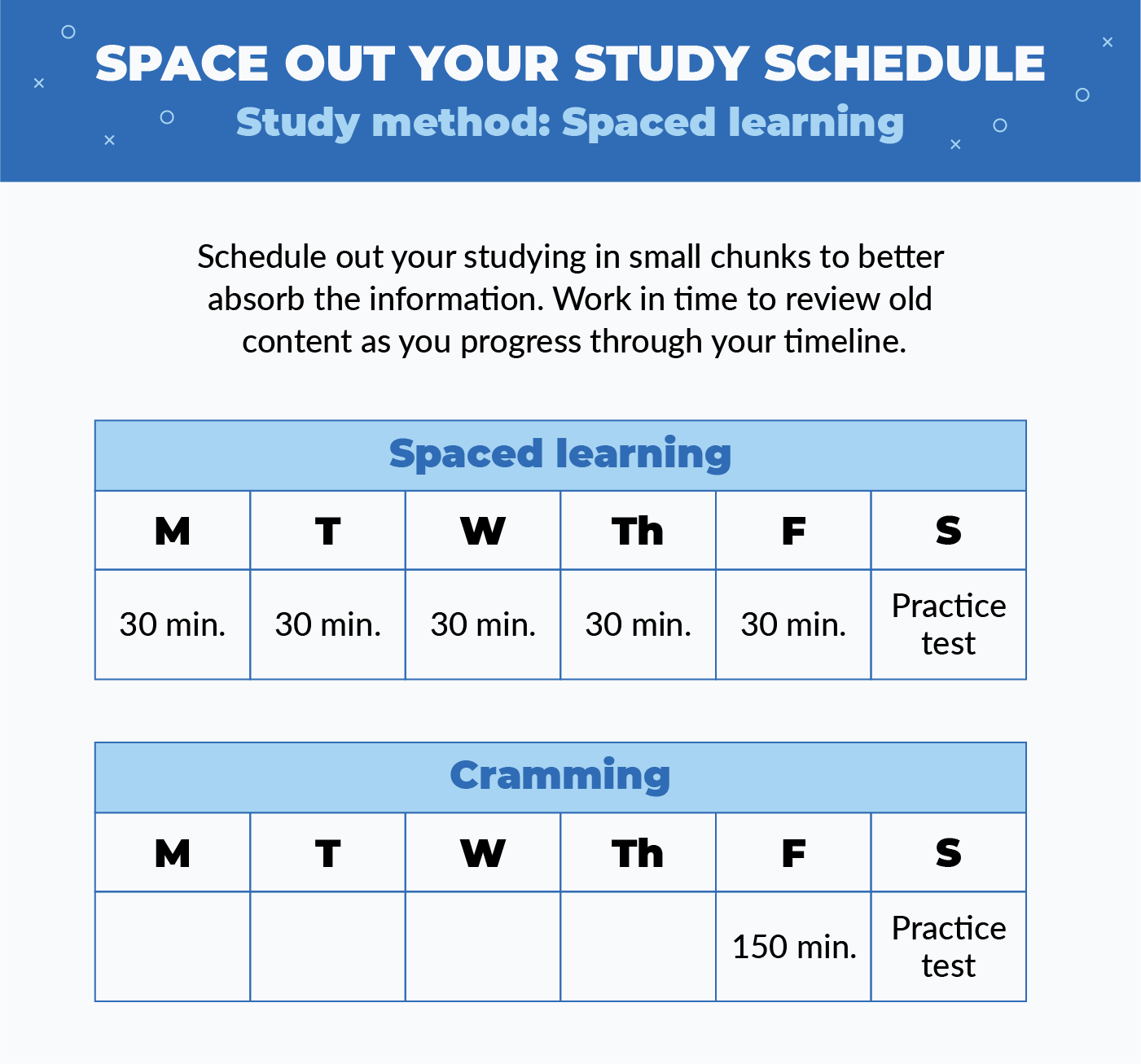 Senior Career Advisor for VelvetJobs William Taylor says you should use exam blueprints, also known as test outlines, to guide your study planning. “Consider your exam blueprint as an outline of the exam. With the blueprint, you will know which topics hold the most weight on the exam and plan to study accordingly.”
Senior Career Advisor for VelvetJobs William Taylor says you should use exam blueprints, also known as test outlines, to guide your study planning. “Consider your exam blueprint as an outline of the exam. With the blueprint, you will know which topics hold the most weight on the exam and plan to study accordingly.”
Inform your roommates and loved ones
Doing anything at home can be tough if everyone is either virtually attending school or working remotely. Since studying demands a lot of your time, you should let your loved ones, roommates, and boss know ahead of time so they can prepare for any necessary changes. Changes could include needing periods of quiet time at home or limited availability for shifts at work.
Dually licensed healthcare professional Marysol Uribe, BSN-RN, FNP-S, says that it’s important to set realistic time blocks to focus on studying without interruptions. She says to “prepare by prioritizing and helping yourself by having a detailed plan for managing your time. Remember to keep your study time sacred and nonnegotiable!”
Create a good study space
After you’ve created your schedule and informed everyone who needs to know, you’ll need to update your study space to make it optimal for studying.
Here are a few things to consider when setting up your study space:
- Good lighting: Lighting is important to ensure you're not straining our eyes. One study in Hippocampus found that dim lighting makes it more difficult to learn and remember. An experiment published in SAGE Open found that students performed better when using special “focus” lighting during tests and other activities that required focus.
- Comfortable chair and desk: In addition to lighting, you’ll need a comfortable chair and desk. Find a good chair with back support and an adjustable height. Back and seat support cushions are cheaper options if you can’t afford a good chair. Instead of a traditional desk, consider a sit-stand desk. An article published in ScienceDaily explains that standing desks help lower blood pressure and decrease back pain.
- Correct sitting position: Mayo Clinic offers a few tips for setting up a healthy work station like keeping your monitor an arm’s length away and adjusting your chair height so your knees are about level with your hips.
- Minimize distractions: Finally, you should pick a spot with minimal distractions—away from the TV, noisy neighbors and whatever else makes your mind wander. Physically getting away from noise isn’t always possible, so you consider investing in things like good headphones, white noise machines, or noise-reducing curtains.

Plan to pass the first time
The last thing you’ll need to work on is your mindset. In school, teachers may have given you extra opportunities to make up a bad grade or even retake a test. For certification exams, retakes aren’t as simple.
Some exams, like the CPA exam, may make you wait a few months before you’re allowed to retake it. This can be stressful and requires more review time to make sure you’re remembering all of the information before your retake. The costs can also add up since most exams have a fee.
Sam Otto, a CPA at Uncle Sam’s Accounting, says that it’s important to do it right the first time. “If you try and cut corners you're going to have to go back and do a retake which will take more time and energy,” he said.
Tips for Studying
Now that you have a plan in place, it’s time to dive into the material. There are many strategies you can use. Corporate Lawyer for King Law & Exit Consulting David King says that you should focus on active learning strategies. “Don’t rely on sitting through class and reading. Your mind will go to sleep,” he said. “Actively engage your mind and you will discover your strengths and weaknesses and retain the material.”
Michael Schaeffer, PMP, got his PMP certification in 2019 and found that interviewing experts, explaining the material to colleagues, and teaching the material to others helped him prepare for his exam. We’ll dive into these and other learning techniques below.
Interview experts
Schaeffer says that interviewing experts is a good way to deconstruct the material. A person who already has your desired certification can talk about different topics based on their experience in the field. Interviewing an expert can also lead to mentorship and even job prospects depending on how you nurture the relationship.
Here are a few ways you can find an expert in your field:
- Ask your current network. Before scouring the internet or attending a networking group, start with people you already know. Your coworkers or friends can potentially connect you with someone in your field.
- Join a professional organization related to your certification. Some organizations have mentorship programs that can help you find a professional who’s willing to answer your questions.
- Network on LinkedIn and other sites. LinkedIn is another great starting point since most people list their certifications on their profile. You can also narrow your search to alumni of your school or professionals in your area to find people with things in common.
- Hop on a Twitter thread. Not all industries have an active community on Twitter. However, it doesn’t hurt to check! Search for hashtags related to your industry and see who’s most active in those conversations.
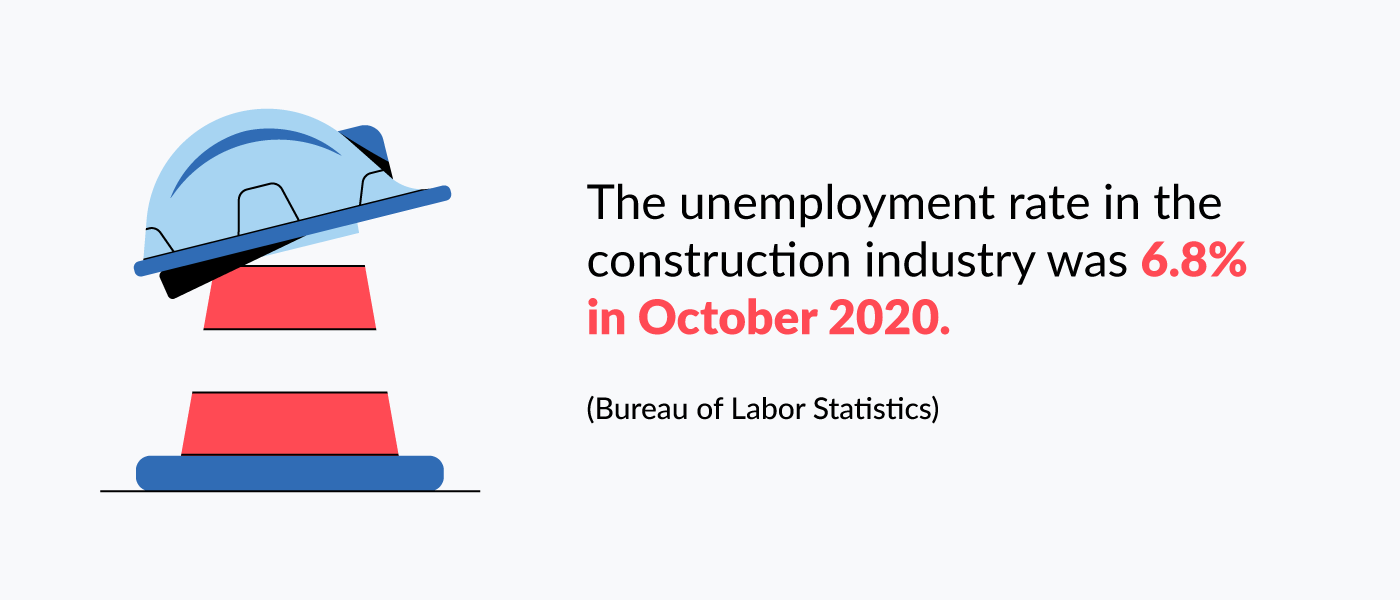
Teach your friends
Next, Schaeffer says you should try teaching the material to a friend who doesn’t know much about the topic. He says this ensures you understand topics on an intimate level. Learning by teaching is often called the “Protégé Effect.”
A study published in the Journal of Science Education and Technology found that students spent more time reading and comprehending the material when preparing to teach others. The researchers suggest that having someone to teach invokes a sense of responsibility that motivates learning, creates an environment to improve knowledge through revision while also protecting students’ egos from the psychological results of failure.
Explain the material to colleagues
Finally, Schaeffer says you should explain your understanding of topics with well-versed colleagues so they can quickly point out any misunderstandings you might have. If you’re taking a course or know other people who are preparing for the exam, you can easily consult them if you have questions or want clarification. This learning style is called peer assessment.
A study published in Educational Psychology Review reviewed 54 experimental and quasi-experimental studies to evaluate the effectiveness of peer assessment. Researchers found that peer assessment better improved academic performance compared to students who did no assessment and teacher assessment.
In addition to interviewing, teaching, and explaining, there are a number of things you can do to reinforce your studying that many certification-passers agree on.
Take assessments while you’re studying
Taking quizzes in between topics can reinforce what you’re studying and can also shine a light on topics you should review. This method is called retrieval practice. A study published in Learning and Instruction found that practice quizzing and free recall ultimately helped test performance. Another study found in the Journal of Educational Psychology that retrieval practice resulted in better results compared to concept mapping.
William Taylor from VelvetJobs says exam practice questions are the most valuable resources for those studying for certification exams. “Some of the things you learned at the beginning of the course may have slipped your mind. Additionally, by doing the practice questions, you can see what areas are your strongest and which ones you need to focus on more before the exam day.”
In addition to taking tests after you’ve learned topics, there are also benefits to taking a test before you start studying. This is simply called “pre-testing.”
A study published in CBE: Life Sciences Education found that students in an introductory biology course who took every pre-exam quiz before their exam did significantly better than students who didn’t take any pre-exam quizzes.
Take practice exams
Most experts we heard from agreed on the importance of practice exams! Practice exams, sample questions, and questions from previous exams are all great sources. You can find these online for free or from a colleague who’s previously taken the exam. Paid practice exams are also available from test prep organizations.
A study published in Psychological Sciences in the Public Interest tested different studying methods including highlighting, rereading, self-explanation, and practice testing. Of all the examined methods, researchers found that practice testing and distributed practice were more easily accessible for students and produced the best results compared to other tested methods.
Florida Peninsula Chief Legal Officer Stacey Giulianti, Esq., says learning the information isn’t a guarantee that you’ll pass your licensing exam. “Take every practice exam you can, scour the internet for questions asked in the past, and break down each question to see how it was asked,” he said. “Without such practice, a test-taker is placing themselves at an extreme disadvantage.” 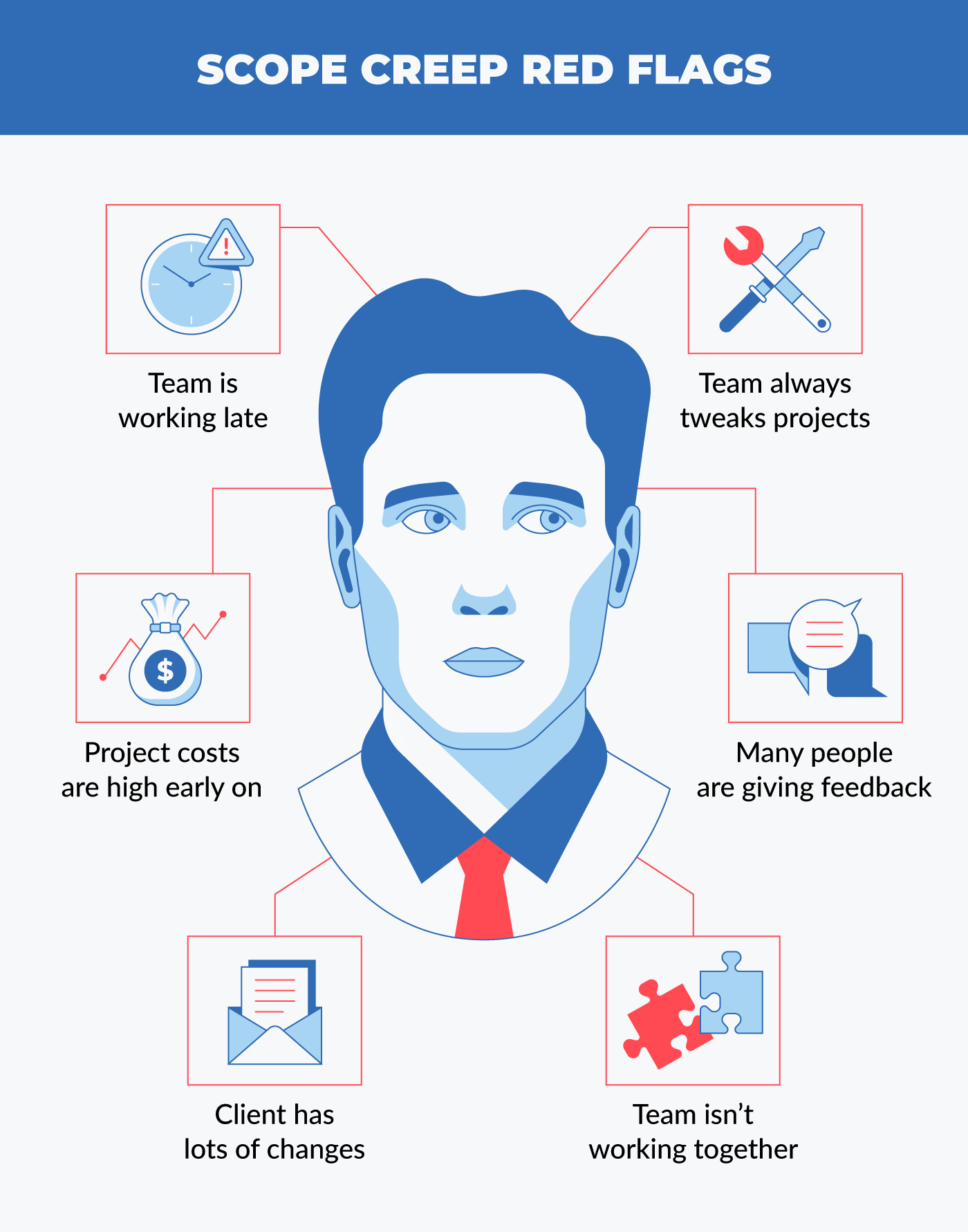
Decide between courses and solo study
Past test takers have different opinions on the benefits of courses compared to studying on your own. At the end of the day, it’s up to your studying preferences as well as the time and money you have available. We explain key differences below.
Courses
Formal courses and prep classes are best for people who prefer a structured approach. You’ll have an instructor to deliver the material and peers you can connect with to review.
Carol Tompkins, Business Development Consultant at AccountsPortal says that you need to go with instructor-led training to prepare for a license or certification exam. “This gives you the opportunity to interact directly with the expert in that field,” she said. “With this kind of training, you get real-world insights, and critical guidance on how to tackle some of the most daunting aspects of the exams.”
A study published in Instructional Science found that secondary students with experience in collaborative learning outperformed students who weren’t experienced with groups.
One advantage of courses is that they’re dependent on their students’ success to survive. More passed students results in more business for them.
Kathleen Owens is a financial adviser at Aurora Financial Planning & Investment Management LLC and says she will always use a professional exam prep company whenever she’s taking a professional exam. “The company is invested in your success and the good ones have great programs that prepare you well,” she said. “Word gets out [about] which companies are good and which ones are not. The bad ones will not survive in the marketplace.”
When it comes to selecting a course, Course Method founder Lisa Parmley says you should look for companies with a proven track record of helping people pass. She also says you should select courses with some level of interactivity like online quizzes, short videos, or audio lessons to make studying more accessible and fun.
Follow these tips to pick a course that works for you:
- Ask about the resources they provide. Are you only paying for the instructor? Do you have access to recordings? Do they provide study outlines or additional audio or video materials?
- See if you can test out the course. Do they offer a trial period? Do they have sample videos or course offerings you can check out?
- Check their refund policy. Do they give you your money back if you don’t pass the course? Are you entitled to a refund if you drop out of the course before the end?
The biggest drawback for courses is the cost. Course cost can make this option inaccessible for some. However, it’s worth the investment if you’re not confident in your abilities to study on your own.
Solo study
Studying on your own is a better option if you prefer designing your own study schedule and planning out your study time, especially if your schedule isn’t predictable.
It’s also a great choice for people who know they are disciplined enough to stick to a study plan and to find study materials. This gives you the opportunity to incorporate your own study tactics like interviewing, creating your own flashcards, and using testing materials from multiple sources.
Founder and Program Director of Pharmacy Tech Scholar, Aaron Emmel, PharmD, MHA, BCPS, says, “Those that feel confident in their own ability to evaluate an exam outline and study from publications may not need the structure of an online course…[They] may be able to save a little money preparing through use of books and other literature.”
Solo study can save you money spent on a course, but may be costly in other ways. For example, you may need to pay to get a practice exam if free ones aren’t available. Solo study can be tough if you prefer learning with others, but don’t already know people who are taking the exam. 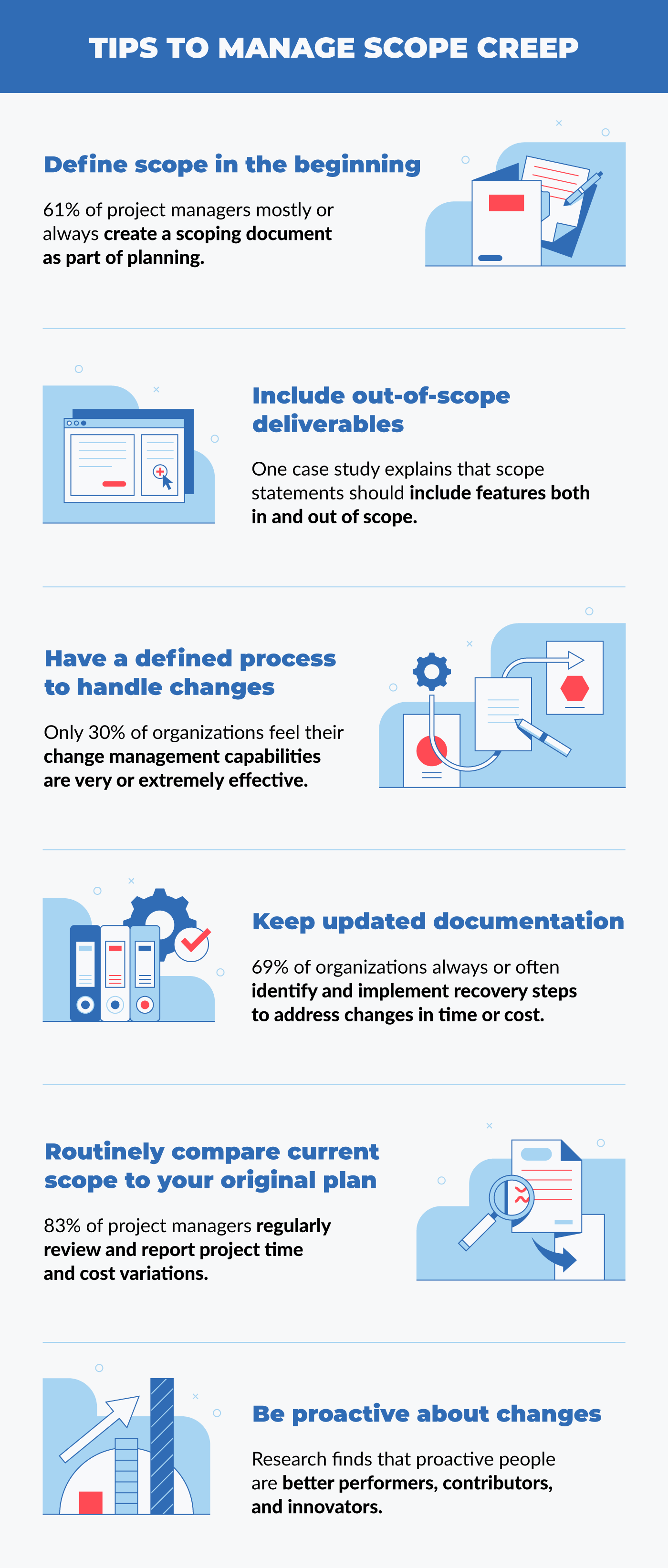
Tips for Test Taking
Certification exams can cumulatively take hours to complete, especially if you’re going for an advanced certification. Studying is only one part of certification exam prep. You also need to prepare to take the test since you’ll be under stressful conditions. Here are a few tips for preparing for your certification exam.
- Practice taking the test. This is another reason why practice tests are crucial. You can experience the pressures of a timed test on top of learning the wording and format of the test. This also gives you an opportunity to mentally plan and practice the time spent in each section.
- Familiarize yourself with the wording and test style. Many certification exams include a multiple choice section. Others might include essay questions or practical sections where you must demonstrate your skills with a tool or scenario.
- Know what’s allowed. Most tests are given on a computer instead of on paper. However, there are many conditions that can differ. For example, some exams allow you to use scratch paper and pencils while others prohibit any outside items.
- Get a good night’s sleep and eat a good breakfast. A study published in Science of Learning found that quality and consistency of sleep was strongly associated with better academic performance.
- Manage test anxiety before and during the test. Brown University advises students to reduce caffeine intake on test day, get to the test site a little early, and to reframe their fears so they don’t get the best of them.
David Mead, founder of LinkdHOME.com, says that certification exams tend to word questions in an unclear way to weed out people who truly understand the subject versus those who just memorized the details. He says the way to prepare for these is to get familiar with the test’s wording.
“Obviously study the material as much as you can, but practice exams are invaluable. Get as many as you can find and do them, then look at why the answers were correct or not,” he said. “Being comfortable with the question format is just as important as knowing the subject matter in these cases.” 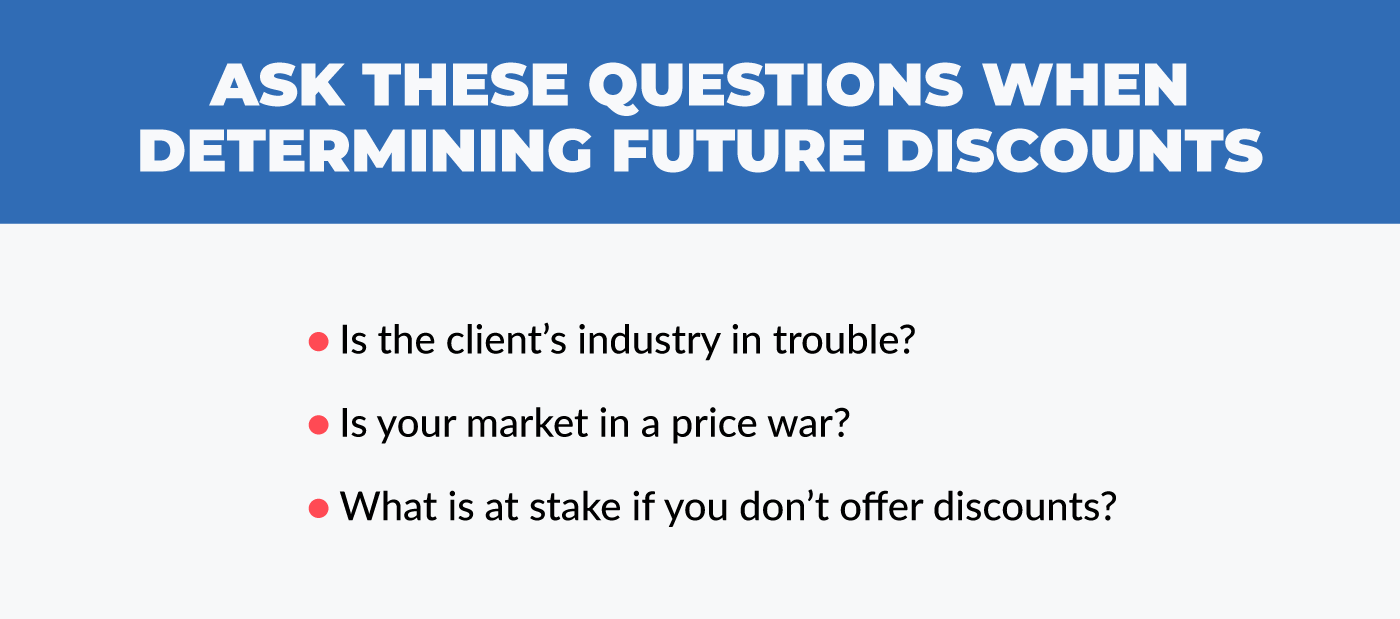 Solid study habits are necessary for any certification test. Intense studying is typically in your future regardless if you’re studying for the Google Analytics certification or an exam for a contractor license. Once you are licensed, you’ll sometimes need a surety bond before you can begin working with clients. Check out our surety bond finder to see if you’re required to get one. Take a look at our infographic below for a quick recap of our guide.
Solid study habits are necessary for any certification test. Intense studying is typically in your future regardless if you’re studying for the Google Analytics certification or an exam for a contractor license. Once you are licensed, you’ll sometimes need a surety bond before you can begin working with clients. Check out our surety bond finder to see if you’re required to get one. Take a look at our infographic below for a quick recap of our guide. 




Leave a Reply